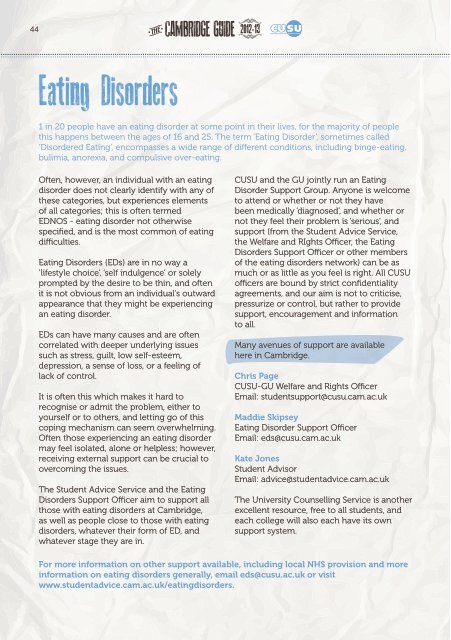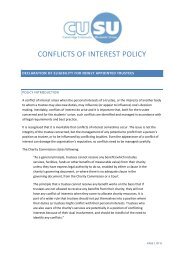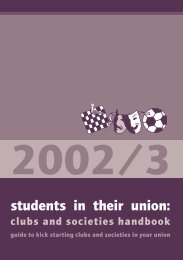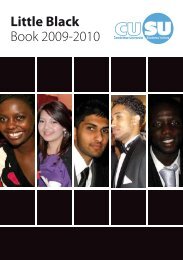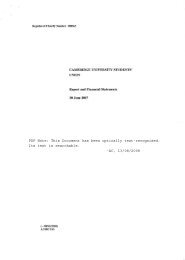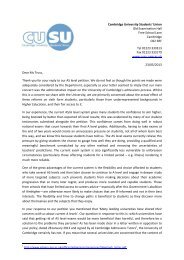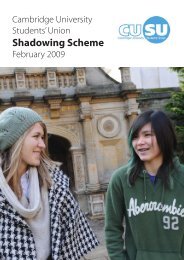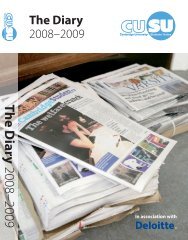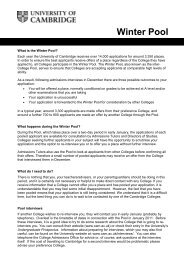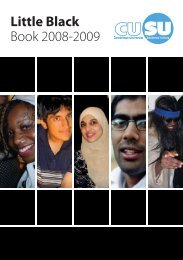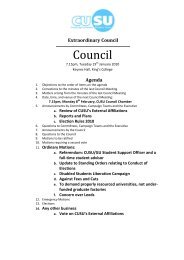The Cambridge (Survival) Guide - Cambridge University Students ...
The Cambridge (Survival) Guide - Cambridge University Students ...
The Cambridge (Survival) Guide - Cambridge University Students ...
You also want an ePaper? Increase the reach of your titles
YUMPU automatically turns print PDFs into web optimized ePapers that Google loves.
44Eating Disorders1 in 20 people have an eating disorder at some point in their lives, for the majority of peoplethis happens between the ages of 16 and 25. <strong>The</strong> term ‘Eating Disorder’, sometimes called‘Disordered Eating’, encompasses a wide range of different conditions, including binge-eating,bulimia, anorexia, and compulsive over-eating.Often, however, an individual with an eatingdisorder does not clearly identify with any ofthese categories, but experiences elementsof all categories; this is often termedEDNOS - eating disorder not otherwisespecified, and is the most common of eatingdifficulties.Eating Disorders (EDs) are in no way a‘lifestyle choice’, ‘self indulgence’ or solelyprompted by the desire to be thin, and oftenit is not obvious from an individual’s outwardappearance that they might be experiencingan eating disorder.EDs can have many causes and are oftencorrelated with deeper underlying issuessuch as stress, guilt, low self-esteem,depression, a sense of loss, or a feeling oflack of control.It is often this which makes it hard torecognise or admit the problem, either toyourself or to others, and letting go of thiscoping mechanism can seem overwhelming.Often those experiencing an eating disordermay feel isolated, alone or helpless; however,receiving external support can be crucial toovercoming the issues.<strong>The</strong> Student Advice Service and the EatingDisorders Support Officer aim to support allthose with eating disorders at <strong>Cambridge</strong>,as well as people close to those with eatingdisorders, whatever their form of ED, andwhatever stage they are in.CUSU and the GU jointly run an EatingDisorder Support Group. Anyone is welcometo attend or whether or not they havebeen medically ‘diagnosed’, and whether ornot they feel their problem is ‘serious’, andsupport (from the Student Advice Service,the Welfare and RIghts Officer, the EatingDisorders Support Officer or other membersof the eating disorders network) can be asmuch or as little as you feel is right. All CUSUofficers are bound by strict confidentialityagreements, and our aim is not to criticise,pressurize or control, but rather to providesupport, encouragement and informationto all.Many avenues of support are availablehere in <strong>Cambridge</strong>.Chris PageCUSU-GU Welfare and Rights OfficerEmail: studentsupport@cusu.cam.ac.ukMaddie SkipseyEating Disorder Support OfficerEmail: eds@cusu.cam.ac.ukKate JonesStudent AdvisorEmail: advice@studentadvice.cam.ac.uk<strong>The</strong> <strong>University</strong> Counselling Service is anotherexcellent resource, free to all students, andeach college will also each have its ownsupport system.For more information on other support available, including local NHS provision and moreinformation on eating disorders generally, email eds@cusu.ac.uk or visitwww.studentadvice.cam.ac.uk/eatingdisorders.


